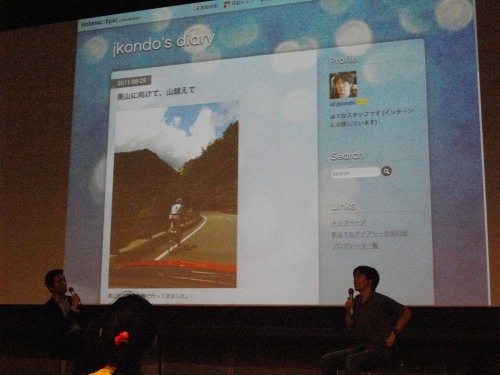I attended WiSH2011+ yesterday (http://agilemedia.jp/wish2011/), an event put on by Agile Media Network (http://agilemedia.jp/en/). The event was held in Tokyo and sponsored by a number of major companies, including Coca Cola Japan, Nikkei Shimbun, and PFU, a Fujitsu company.

I signed up for the event through Fans:Fans, as a blogger, promising to blog about the event to my followers. I was late to find out about the event, which was billed as not only the Social Media Summit, but about the pinnacle of Japan’s efforts concerning Web, Innovation, and SHare. I was most interested in the topics of some of the sessions, about how Japanese ventures could compete globally.
I’ve been concerned, of course, with the issue of how Japanese can compete globally for the bulk of my career. I’ve also been concerned with entrepreneurship, too, having the bug myself in that I will keep trying to initiate ventures that make the world better, safer, more kind, just, and sustainable for human life. So I registered for the already fully registered event, hoping that I could gain admission without just showing up unannounced.
So I ended up posting about the event all day on Twitter and making notes using Evernote, thinking that both are representative of the kinds of web applications/services that was the subject of the event and the goal of the entrepreneurs vying for the approval of the audience in Part 2 of WISH2011+. Rereading my notes, reviewing the hashtags on Twitter, and trying to remember what made me think, I found that most of what I learned and regarded important were observations about how things happened and what was missing or left unsaid. There was precious little that made me DO anything. Or made me WANT to do anything, really. There were a few, certainly, and I exchanged business cards with a few of the featured successful entrepreneurs and venture presenters. I plan to write about a few of them in other posts.
But most of all, I was left with more questions than answers. But that was to be expected, I suppose. It wasn’t as though I was looking for the next Google.
What I found, though, was one question worth writing about: Hatena. Hatena is the Japanese word for a question mark. I knew that Hatena was a Japanese blog site, that had some social media implications. I’d used it when researching people in Japan, learning about how people are connected and their personal interests. I hadn’t realized why it worked, but did know that the way in which data was meta-tagged enabled data to be linked virtually. It works.
So when
Junya Kondo, President of Hatena was the first speaker, I was somewhat interested. What I found, though, was a lot more. After starting his company and service in Kyoto, Kondo went through several periods of uncertainty and adventure.
Kondo moved his company from Kyoto to Tokyo in 2004, thinking that he should be where the majority of his business originated. In 2006, he decided that since his intent was to build a service that would make a difference in the world, he set off himself for Silicon Valley and establish his subsidiary there. 2 years later, he returned, realizing that to win global success his applications and services had to be extremely good, useful, and beneficial; Kondo came to see that his best opportunity to achieve this would be to be where HE was comfortable, confident, and happy. Upon his return to Japan, he moved back to his hometown, Kyoto, dividing the company’s core into two – development in Kyoto and sales in Tokyo.
In every case, it was obvious that Kondo made a decision based on what he thought was best – for his company, his service(s), and himself. But he was not afraid of the risks stemming from adventure into the unknown. In fact, it was the adventure that led Kondo to make the decisions that became part of his success.
I signed up to Hatena during the seminar. Even though I have this blog, on Posterous, I vowed to blog on Hatena (
mikekato on Hatena), albeit with a less educational or, at least, less English-based content. I thought then that if there was any way in which I could have an impact on the success of Hatena globally, I would make an effort to do so. It just seemed so right – and adventurous.
This experience cuts to the core of my ideas about learning, about how we learn and what we learn for. This blog you’re reading is called
KnowCanDo. Knowing first, we look for the things we Can do and build confidence that we Can. Then comes the DOing. If we Do, then we learn a lot not only about what we thought we knew, but find out what we Can and Can’t get done. We also learn a lot about he process, and the means by which we can improve. And, we gain the confidence and the curiosity to try again (and again).
JKondo is also an avid cyclist, it seems. Righteous. This adventure is just getting started!


